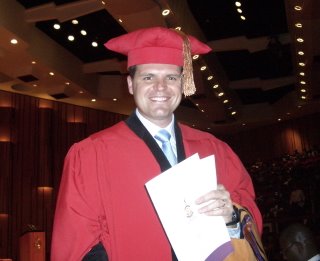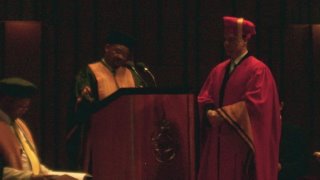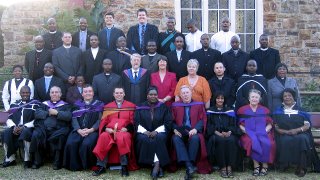 The address below was given by Stanley Hauerwas at the Duke University PhD Commencement (something akin to a European Graduation). It is humorous, deeply challenging, and will strike a cord with every person who has ever done a piece of academic work in which they have "struggled to say what defies saying"..... Wes, Ruth, Phidian, Pete, Jenny... you all know that feeling too well!
The address below was given by Stanley Hauerwas at the Duke University PhD Commencement (something akin to a European Graduation). It is humorous, deeply challenging, and will strike a cord with every person who has ever done a piece of academic work in which they have "struggled to say what defies saying"..... Wes, Ruth, Phidian, Pete, Jenny... you all know that feeling too well!
Let me ask you this question: Have you ever been to a graduation and understood the title of someone else's thesis or dissertation?. No? Well, neither have I....
"The simple cellular cultures in the stomach of the east African Mossie in the months of July and August as they relate to global warming and the consumption of fossil fuels in the Southern regions of East Asia"
Or some such...
A colleague of mine, Comrade Phidian Matsepe used to say "If you want to hide something from an African, just put it in a book". Of course he was making the point that we are lazy when it comes to reading.
I want to encourage you to read the next few paragraphs, let me know what you think! Why should we have Universities? Are they even relevant in the current milue, are they relevant in Africa? Do we still need the 'ivory tower' of the academy? Should people spend years of their lives studying towards degrees whose titles even other Doctors cannot understand?
Enquiring minds want to know! Stanley Hauerwas also gave some thoughts on this. It makes for a wonderful read. Maybe it will inspire one or two more Africans to make the African voice heard in the world academic arena.
FOR DAPPLED THINGS
Commencement Address for Ph.D. Ceremony Duke University, 1996
--by Stanley Hauerwas
The Divinity School, Duke University
Being the smart people I know you to be I assume most of you have just discovered one of the most important survival skills an academic needs--that is, how to get through commencement exercises without dying of boredom. It has been some years since you went through a commencement. You had forgotten how long they can be. You forgot to bring anything to read. Desperate, you turned to the Commencement program and to your delight discovered the listing of the dissertation titles. Even better, you discovered your dissertation title. Then you thought, "I can get through the rest of this event by reading the other dissertation titles."
Of course that is when the trouble begins. You are on the brink of having your Ph.D conferred--which surely puts you among the brightest of the bright in this society--but you discover not only do you not have a clue to what most of the other dissertations are about, but you cannot even read their titles with understanding. After discounting the hypothesis that this might have to do with your limitations, you then begin to wonder about the institution from which you are graduating. For you could understand just enough about some of the titles to make you wonder what kind of university would allow someone to graduate with a Ph.D working on this kind of stuff. Just remember the person sitting next to you is probably thinking the same thing about your dissertation.
All of which is to say, "Congratulations on the completion of your work and welcome to the rest of your life!" I realize that some of you will not stay in the university, but from this moment on, for better or worse you are citizens of the university. You owe us. I realize this is not a time to tell you, "You owe us," but if we are to continue to be a place that can graduate people who cannot understand the person next to them at graduation, we are going to need your help. We need you to help us tell those who are not part of the university why they should want to support communities and institutions who produce people like you and me.
The humbling experience of not being able to communicate with the person next to you is not something that is peculiar to this occasion. It is in the character of the modern university. I served on a committee in the university for some years that required me to be confronted by people from other disciplines. When I first heard about random walks, I thought this must be someone's project from the School of the Environment to lay trails in Duke Forest. Imagine my surprise to discover "random walks" is a subject in the Department of Mathematics. Then there was tribology. I thought surely this was an area in the Program in Literature dealing with the Star Trek episode about "Tribbles." That is, I thought it possible this was another profound probing by cultural studies to illumine the production and reproduction of the capitalist subtext. It turns out the subject does have to do with capital, since it involves oil. For tribology is the study of friction, and oil can reduce friction. There is, moreover, a Journal of Tribology, so we know it must count as an academic discipline!
Some within the university, and many external to the university, think the fact that we cannot understand one another's dissertation titles is surely an indication that something has gone wrong with the contemporary university. They assume what is wrong with the university is nicely exemplified by occasions like this. What could I possibly say that would be of interest to such a diverse group? Yet this occasion but reproduces the everyday politics of most universities, whether they be large or small, research universities or liberal art colleges. When faculties come together to discuss matters of common concern, we discover the only matters about which we have a common concern are which parking lot we got assigned, the conditions of Card Gym, or perhaps, health insurance. The issue is no longer the two-cultures made famous by C. P. Snow, but the many cultures both between departments and within departments. Departments often are names for diverse methodologies which share nothing in common other than perhaps proximity of offices and labs.
Yet I am not convinced that such a view of the university, and/or of your work in it, is justified. This is an odd position for me to take since I am a theologian. Theology may once have aspired to be the queen of the sciences, but such an ambition today by any discipline would only be laughable. Moreover, theology--like philosophy and, I think, many of the humanities--is a discipline where there is nothing new to learn. For us all the "data" is in. So we cannot pretend to produce the kind of knowledges that seem to legitimate the current proliferation of disciplines. The problem for theology is how to understand what we know by attending to those in our past who struggled to say what defies saying. That, of course, requires being initiated into a discipline, which means theologians also write dissertations with titles that are not immediately understood.
Our inability to read and understand one another's dissertation titles is not in itself a sign that something has gone wrong, but rather a testimony to the discipline, the sheer hard work, necessary to understand a few things well. That you are all receiving a common degree at this time indicates you share more in common than your dissertation titles suggest. You have each submitted yourselves to the discipline of the past and current masters of your craft in order that you exemplify in your own life the passion of your subject.
I realize, of course, that the language of passion may seem far too dramatic to characterize the years you have spent in your doctorate work. Drudgery may seem closer to the mark. Yet surely passion must infuse the drudgery; for otherwise how are we to explain the exactness of your dissertation titles? Such exactness is required by the details--details, moreover, that can be appreciated only by those who have submitted themselves to the discipline necessary to see why such details matter. That you have now made those details matter surely suggests that at one time and at one place you fell in love. Or put differently, at one time and at one place you were possessed with the desire to want to know, for example, why butterfly wings differ, how songbirds sing, or why Trollope is the greatest English novelist. The reason you cannot easily communicate what you have learned is that the truth is in the details of such study, details that can only be appreciated by undergoing the discipline you have undergone.
But why would anyone want to undergo such discipline? Stanley Fish explains it this way:
"Literary interpretation, like virtue, is its own reward. I do it because I like the way I feel when I'm doing it. I like being brought up short by an effect I have experienced but do not understand analytically. I like trying to describe in flatly prosaic words the achievement of words that are anything but flat and prosaic. I like savoring the physical 'taste' of language at the same time that I work to lay bare its physics. I like uncovering the incredibly dense pyrotechnics of a master artificer, not least because in praising the artifice I can claim a share in it. And when those pleasures have been (temporarily) exhausted, I like linking one moment in a poem to others and then to moments in other works, works by the same author or by his predecessors or contemporaries or successors. It doesn't finally matter which, so long as I can keep going, reaping the cognitive and tactile harvest of an activity as self-reflexive as I become when I engage in it." (Professional Correctness: Literary Studies and Political Change, p. lb)
But remember, Stanley also reminds his students when they express admiration or Milton's poetry that Milton does not want their admiration: he wants their souls.
Fish's account may be peculiar to literary criticism and, no doubt, other literary critics would be quite critical of his understanding of why he does what he does. Yet I think he rightly indicates why many of us are attracted to the details of our disciplines. I have noticed, for example, that the highest accolade one mathematician can give another is to describe her work as "deep." A physicist's work must be "elegant." Yet just to the extent our work attains such beauty, it becomes hard for us to understand one another, though we may and should come to appreciate what one another does. Yet such appreciation is hard won and even harder for those who are not part of the world we call the university. Which means they (that is, those not part of our world) can rightly ask why they should pay for Stanley Fish to get such pleasure from the study of poetry?
There is no easy answer to this question, though I think there are answers. We can begin by observing that there exists no intrinsic tension between a Fish-like understanding of our work and our work being useful. I was once giving a lecture at Iowa State University (long before the wonderful novel Moo had been written). Since I am a compulsive jogger, I was running around the campus in the dark of the early morning. I passed a huge building that was fronted by enormous Greek columns, but because of the dark I could not read the inscription above the columns. I came around later after the sun had come up and discovered that chiseled in marble above those columns was the wonderful word, "MILK." I thought, what a wonderful way to organize knowledge! Indeed I hope that chairs of the departments of Physics and/or English at Iowa State University report to the Dean of the School of Milk.
Yet as useful as the study of milk is, such usefulness often cannot provide adequate justification for the practices actually required for such study. For milk, no more than poetry or virtue, is not an end in itself but rather gains its significance as part of a network of needs and goods that represent a community's traditions. The university represents those set aside to serve and remember those goods through the patient love of details. Why we should be paid, or better--privileged, to do such work is because we believe the world in which we live would be the poorer if people like us and our passions did not exist. As those who have been privileged to have been given the time for the work represented by this ceremony, you now have the duty to help those not so privileged understand our passions as a contribution to our common goods.
That we cannot read one another's dissertation titles, therefore, may not be a sign of failure, but rather an indication we are rightly reflecting the truthful differences that make our world so beautiful. Such beauty makes it difficult for us to understand one another and in the process we are humbled not only by having to acknowledge all that we do not know, but even more by that which we have tried to know. And humility is that virtue most required if we are truthfully to tell one another what we know but do not understand. Moreover, I believe God enjoys the details, and we would not truthfully reflect God's creation if we hid the differences required by the details. Accordingly, I can do no better than to close with the words of Gerard Manley Hopkins:
Glory be to God for dappled things
For skies of couple-color as a brinded cow;
For rose-moles all in stipple upon trout that swim;
Fresh-firecoal chestnut-falls; finches' wings;
Landscapes plotted and piecedfold, fallow, and plow;
And all trades, their gear and tackle and trim.
All things counter, original, spare, strange;
Whatever is fickle, freckled (who knows how?)
With swift, slow; sweet, sour; adazzle, dim;
He fathers-forth whose beauty is past change:
Praise Him.
And so, I pray, may your life and work be dappled, as you go forth from this place. [
http://www.duke.edu/web/FacultyForum/vol8/ffoct.htm]
 Friday, October 27, 2006 at 3:04PM
Friday, October 27, 2006 at 3:04PM 












